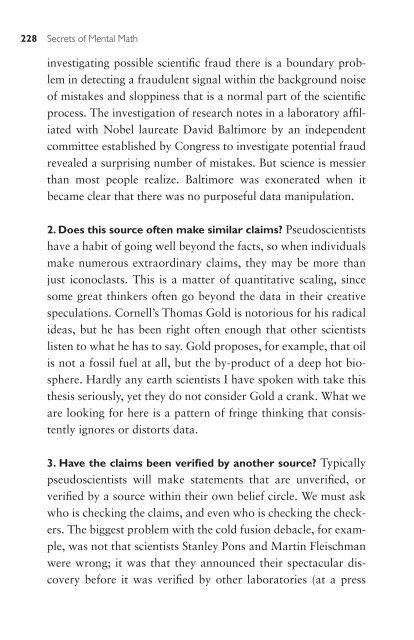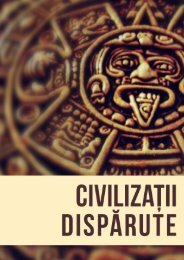- Page 2 and 3:
This book has been optimized for vi
- Page 5 and 6:
SECRE+S OF MEN+AL MA+H The Mathemag
- Page 7:
I dedicate this book to my wife, De
- Page 11 and 12:
Contents Foreword by Bill Nye (the
- Page 13 and 14:
Foreword by Bill Nye (the Science G
- Page 15 and 16:
Foreword xiii Well, actually, I hop
- Page 17:
Foreword xv there are also an infin
- Page 20 and 21:
xviii Foreword math nut. Immunizati
- Page 22 and 23:
xx Prologue in on his secrets of
- Page 24 and 25:
xxii Prologue where he learned thes
- Page 26 and 27:
xxiv Introduction Too often, math i
- Page 28 and 29:
2 Secrets of Mental Math 35 2 What
- Page 30 and 31:
4 Secrets of Mental Math Absolutely
- Page 32 and 33:
6 Secrets of Mental Math Similarly,
- Page 34 and 35:
8 Secrets of Mental Math Although I
- Page 36 and 37:
10 Secrets of Mental Math Exception
- Page 38 and 39:
12 Secrets of Mental Math math in y
- Page 40 and 41:
14 Secrets of Mental Math 67 28 8
- Page 42 and 43:
16 Secrets of Mental Math 858 7 re
- Page 44 and 45:
18 Secrets of Mental Math lot easie
- Page 46 and 47:
20 Secrets of Mental Math Carl Frie
- Page 48 and 49:
22 Secrets of Mental Math Of course
- Page 50 and 51:
24 Secrets of Mental Math 958 417
- Page 52 and 53:
26 Secrets of Mental Math to 10. We
- Page 54 and 55:
28 Secrets of Mental Math By roundi
- Page 56 and 57:
30 Secrets of Mental Math mentally,
- Page 58 and 59:
32 Secrets of Mental Math 48 40 8
- Page 60 and 61:
34 Secrets of Mental Math problems
- Page 62 and 63:
36 Secrets of Mental Math 3-BY-1 MU
- Page 64 and 65:
38 Secrets of Mental Math sometimes
- Page 66 and 67:
40 Secrets of Mental Math 376 (300
- Page 68 and 69:
42 Secrets of Mental Math 925 (900
- Page 70 and 71:
44 Secrets of Mental Math BE THERE
- Page 72 and 73:
46 Secrets of Mental Math 41 2 1 42
- Page 74 and 75:
48 Secrets of Mental Math other squ
- Page 76 and 77:
50 Secrets of Mental Math WHY THESE
- Page 78 and 79:
52 Secrets of Mental Math Similarly
- Page 80 and 81:
54 Secrets of Mental Math Gardner o
- Page 82 and 83:
56 Secrets of Mental Math same digi
- Page 84 and 85:
New and Improved Products: Intermed
- Page 86 and 87:
60 Secrets of Mental Math 59 (60 1
- Page 88 and 89:
62 Secrets of Mental Math 88 (90 2
- Page 90 and 91:
64 Secrets of Mental Math To see ho
- Page 92 and 93:
66 Secrets of Mental Math Remember
- Page 94 and 95:
68 Secrets of Mental Math 67: 67 3
- Page 96 and 97:
70 Secrets of Mental Math EXERCISE:
- Page 98 and 99:
72 Secrets of Mental Math Rounding
- Page 100 and 101:
74 Secrets of Mental Math 2. The ea
- Page 102 and 103:
76 Secrets of Mental Math 13 1,000
- Page 104 and 105:
78 Secrets of Mental Math Chapter 8
- Page 106 and 107:
Chapter 4 Divide and Conquer: Menta
- Page 108 and 109:
82 Secrets of Mental Math Let’s t
- Page 110 and 111:
84 Secrets of Mental Math 439 52196
- Page 112 and 113:
86 Secrets of Mental Math In using
- Page 114 and 115:
88 Secrets of Mental Math 682 23 I
- Page 116 and 117:
90 Secrets of Mental Math 67 543657
- Page 118 and 119:
92 Secrets of Mental Math original
- Page 120 and 121:
94 Secrets of Mental Math way is to
- Page 122 and 123:
96 Secrets of Mental Math 6 7 8 .
- Page 124 and 125:
98 Secrets of Mental Math You can e
- Page 126 and 127:
100 Secrets of Mental Math A number
- Page 128 and 129:
102 Secrets of Mental Math Divisibi
- Page 130 and 131:
104 Secrets of Mental Math It is al
- Page 132 and 133:
106 Secrets of Mental Math So, To a
- Page 134 and 135:
Chapter 5 Good Enough: The Art of
- Page 136 and 137:
110 Secrets of Mental Math Notice t
- Page 138 and 139:
112 Secrets of Mental Math 8,367 5
- Page 140 and 141:
114 Secrets of Mental Math onds doe
- Page 142 and 143:
116 Secrets of Mental Math We obser
- Page 144 and 145:
118 Secrets of Mental Math Divide:
- Page 146 and 147:
120 Secrets of Mental Math roots. I
- Page 148 and 149:
122 Secrets of Mental Math MORE TIP
- Page 150 and 151:
124 Secrets of Mental Math I will s
- Page 152 and 153:
126 Secrets of Mental Math number o
- Page 154 and 155:
128 Secrets of Mental Math and sinc
- Page 156 and 157:
130 Secrets of Mental Math EXERCISE
- Page 158 and 159:
132 Secrets of Mental Math COLUMNS
- Page 160 and 161:
134 Secrets of Mental Math As illus
- Page 162 and 163:
136 Secrets of Mental Math 4. 3 5 8
- Page 164 and 165:
138 Secrets of Mental Math Next, we
- Page 166 and 167:
140 Secrets of Mental Math You have
- Page 168 and 169:
142 Secrets of Mental Math 853 762
- Page 170 and 171:
144 Secrets of Mental Math Step 4.
- Page 172 and 173:
146 Secrets of Mental Math Shakunta
- Page 174 and 175:
148 Secrets of Mental Math Here’s
- Page 176 and 177:
150 Secrets of Mental Math EXERCISE
- Page 178 and 179:
152 Secrets of Mental Math work by
- Page 180 and 181:
154 Secrets of Mental Math words: m
- Page 182 and 183:
156 Secrets of Mental Math 93: bum,
- Page 184 and 185:
158 Secrets of Mental Math And: 69
- Page 186 and 187:
160 Secrets of Mental Math 42 384
- Page 188 and 189:
162 Secrets of Mental Math 362 beco
- Page 190 and 191:
164 Secrets of Mental Math learned
- Page 192 and 193:
166 Secrets of Mental Math Once you
- Page 194 and 195:
168 Secrets of Mental Math Thomas F
- Page 196 and 197:
170 Secrets of Mental Math numbers
- Page 198 and 199:
172 Secrets of Mental Math Then do
- Page 200 and 201:
174 Secrets of Mental Math 629 (630
- Page 202 and 203:
176 Secrets of Mental Math 858 15
- Page 204 and 205: 178 Secrets of Mental Math Using th
- Page 206 and 207: 180 Secrets of Mental Math Adding 8
- Page 208 and 209: 182 Secrets of Mental Math If both
- Page 210 and 211: 184 Secrets of Mental Math I diagra
- Page 212 and 213: 186 Secrets of Mental Math In our n
- Page 214 and 215: 188 Secrets of Mental Math produces
- Page 216 and 217: 190 Secrets of Mental Math be conve
- Page 218 and 219: 192 Secrets of Mental Math (e.g., 4
- Page 220 and 221: 194 Secrets of Mental Math As with
- Page 222 and 223: 196 Secrets of Mental Math I should
- Page 224 and 225: 198 Secrets of Mental Math Since yo
- Page 226 and 227: 200 Secrets of Mental Math 3. divid
- Page 228 and 229: 202 Secrets of Mental Math Hence, a
- Page 230 and 231: 204 Secrets of Mental Math 2 on lin
- Page 232 and 233: 206 Secrets of Mental Math 1 5 2
- Page 234 and 235: 208 Secrets of Mental Math The quot
- Page 236 and 237: 210 Secrets of Mental Math ask the
- Page 238 and 239: 212 Secrets of Mental Math the squa
- Page 240 and 241: 214 Secrets of Mental Math Why This
- Page 242 and 243: 216 Secrets of Mental Math rest of
- Page 244 and 245: 218 Secrets of Mental Math Year Cod
- Page 246 and 247: 220 Secrets of Mental Math For date
- Page 248 and 249: Chapter ∞ Epilogue: How Math Help
- Page 250 and 251: 224 Secrets of Mental Math There is
- Page 252 and 253: 226 Secrets of Mental Math seniors,
- Page 256 and 257: 230 Secrets of Mental Math 7. Is th
- Page 259 and 260: Answers CHAPTER 1: A LITTLE GIVE AN
- Page 261 and 262: Answers 235 Three-Digit Subtraction
- Page 263 and 264: 13. 757 14. 259 15. 297 297 16. or
- Page 265 and 266: Answers 239 2 100 5. 98 2 9600 2 2
- Page 267 and 268: Answers 241 2-by-2 Addition-Method
- Page 269 and 270: 2-by-2 Factoring-Method Multiplicat
- Page 271 and 272: Answers 245 13. 38 63 (9 7) 15.
- Page 273 and 274: Answers 247 234 17 3. 217 2 46,800
- Page 275 and 276: Answers 249 CHAPTER 4: DIVIDE AND C
- Page 277 and 278: Answers 251 23. 4,425,575 No: 4 4
- Page 279 and 280: Answers 253 7. 7 8 1 1 4 1
- Page 281 and 282: Answers 255 9. 104,972 10. 5,462,74
- Page 283 and 284: Square Root Guesstimation (page 150
- Page 285 and 286: 3-by-2 Exercises Using Factoring, A
- Page 287 and 288: 21. 281 or 281 (280 1) 44 (11 4
- Page 289 and 290: Answers 263 3. 58,324 2 “Liver”
- Page 291 and 292: 3-by-3 Multiplication (page 192) 1.
- Page 293 and 294: Answers 267 13. 783 (87 9) 589 1
- Page 295 and 296: Answers 269 5-by-5 Multiplication (
- Page 297 and 298: Bibliography RAPID CALCULATION Cutl
- Page 299 and 300: Index addition: an “amazing” su
- Page 301 and 302: Index 275 factoring a number: in th
- Page 303 and 304: Index 277 three-by-two problems, 16
- Page 305:
About the Authors DR. ARTHUR BENJAM




